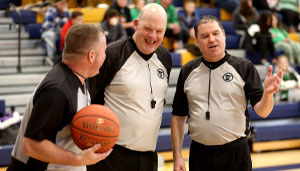There’s an interesting phenomenon that occurs among coaches as soon as their season is over: many coaches completely lose their minds. Contrary to the satisfaction that should accompany the end of another season, many coaches quickly switch into preparation for next year’s season. As a coach, here’s what happens after the final game of the season:
- Scenario 1 – Your team finished as the state champs. This triggers a sense of accomplishment and relief … immediately followed by a sense of panic because someone will expect the same result next year. Because of that, you start leaning on your returning athletes to get in the weight room, start open gyms, sign up for summer camps, etc.
- Scenario 2 – Your team made the state tournament but just missed being the state champs. After consoling the team for whatever tough loss just occurred, you point out how close they were to gold. Because of that, you start leaning on your returning athletes to get in the weight room, start open gyms, sign up for summer camps, etc.
- Scenario 3 – Your team falls short of an advancing tournament, but overall, you overachieved this year. This triggers that same sense of accomplishment and relief as in Scenario 1 … immediately followed by the thought that you could have done better. Because of that, you start leaning on your returning athletes to get in the weight room, start open gyms, sign up for summer camps, etc.
- Scenario 4 – Your team loses out of a tournament and you performed pretty much to expectations for the year. After congratulating your team for doing exactly what you had hoped to do this year, you raise the bar for them for next year. Because of that, you start leaning on your returning athletes to get in the weight room, start open gyms, sign up for summer camps, etc.
- Scenario 5 – Your team under performed this year. For whatever reason, you couldn’t get things going, nothing seemed to go right, and the whole season felt like a grind. Because of that, you vow that it won’t happen again next year, challenge your returning athletes, then start leaning on them to get in the weight room, start open gyms, sign up for summer camps, etc.
Of course, while this is going on, there are several other things happening as well.
- The next season’s coaches, who have been salivating about their upcoming seasons for two months, immediately contact the athletes about starting their open gyms on Monday.
- Summer club coaches, who feel like they’ve patiently waited long enough, start distributing information about registration, try-outs, practices and games, and remind the athletes about how important they feel their club programs are towards the development and improvement of the athlete’s ability.
- Their previous season’s coaches, who have finally put away last season and are looking forward to next season, immediately contact the athletes about getting in the weight room or starting off season camps.
- The parents, who just finished following their kids around for the season, would like to have their kids at home for a bit before getting started with whatever is next.
- The students, who just finished a long season, would really like to take a few days off before doing the next thing – whether that’s the next sport (which is preferred), off-season training, or something else. It may come as a surprise to many that most athletes have hobbies, interests, friends, etc. outside of athletics that they largely ignore during the season.
Now, balance all of that with something I’ve said before: winning is a by-product of many, many different things. In my school district, I have 41 varsity teams that compete throughout the school year. All of those teams fit into one of the five scenarios listed above, but here’s the catch: I don’t honestly believe that those teams would have finished much differently had the athletes started off-season stuff earlier or more intensely than they actually did following their previous season.
We had teams that finished as state champions and we had teams that finished the year towards the bottom of the pack. All of those finishes were affected by factors much greater than an off-season workout regime. Some of those include genetic ability, decision making, injury, illness, social problems, etc. Beyond that, sometimes kids are on and sometimes kids are off.
I’m not suggesting that we abandon all attempts at getting better for next year; I’m just saying that it’s ok to give the athletes some time off. We don’t need to keep our foot on the gas pedal for the whole year.
- For athletes competing in another sport, let that sport’s coaches have them. They don’t need additional pressure from their other coaches.
- Upcoming season’s coaches, give them a little time to breath and rest. If they just finished a season on Saturday, they may need a little time to come down from that season before they can be expected to be prepared for the next sport. Their absence from open gyms for a while will be just fine … taking a week off isn’t going to change where your team finishes this season.
- For athletes only competing in one sport, why the heck aren’t they in another sport? Let’s find them something they can do.
- But for those athletes who choose to specialize, strength, agility, and flexibility training is a good thing for everyone. Let them rest for a while then get them in the weight room (preferably with someone who knows what he/she is doing).
In short, coaches, keep your season in perspective. Give yourself some time to process the season as a whole before deciding what steps to take for next season, and give you athletes a little bit of time to just be kids.
Mark Rerick
Mark Rerick, CMAA, has been an athletic director since 2006. After spending time splitting duties at other schools as a teacher, coach and principal, he has been the full time athletic director for Grand Forks (ND) Public Schools since 2012.
Most Recent Articles
- nfhs news NFHS Learning Center Delivers 25 Millionth Course
- Track & Field/Cross Country article Effective Communication with Athletes and Coaches
- nfhs news Player Equipment Changes Highlight 2025 High School Football Rules Revisions
- Player Equipment Changes Highlight 2025 High School Football Rules Revisions
- nfhs news Judgment Call on Second Contact Eliminated in High School Volleyball






